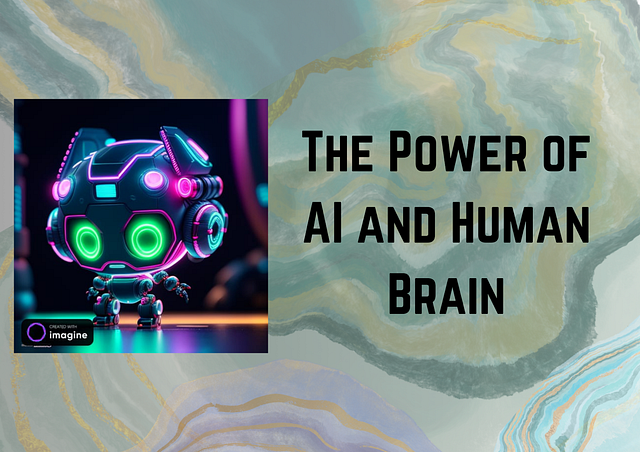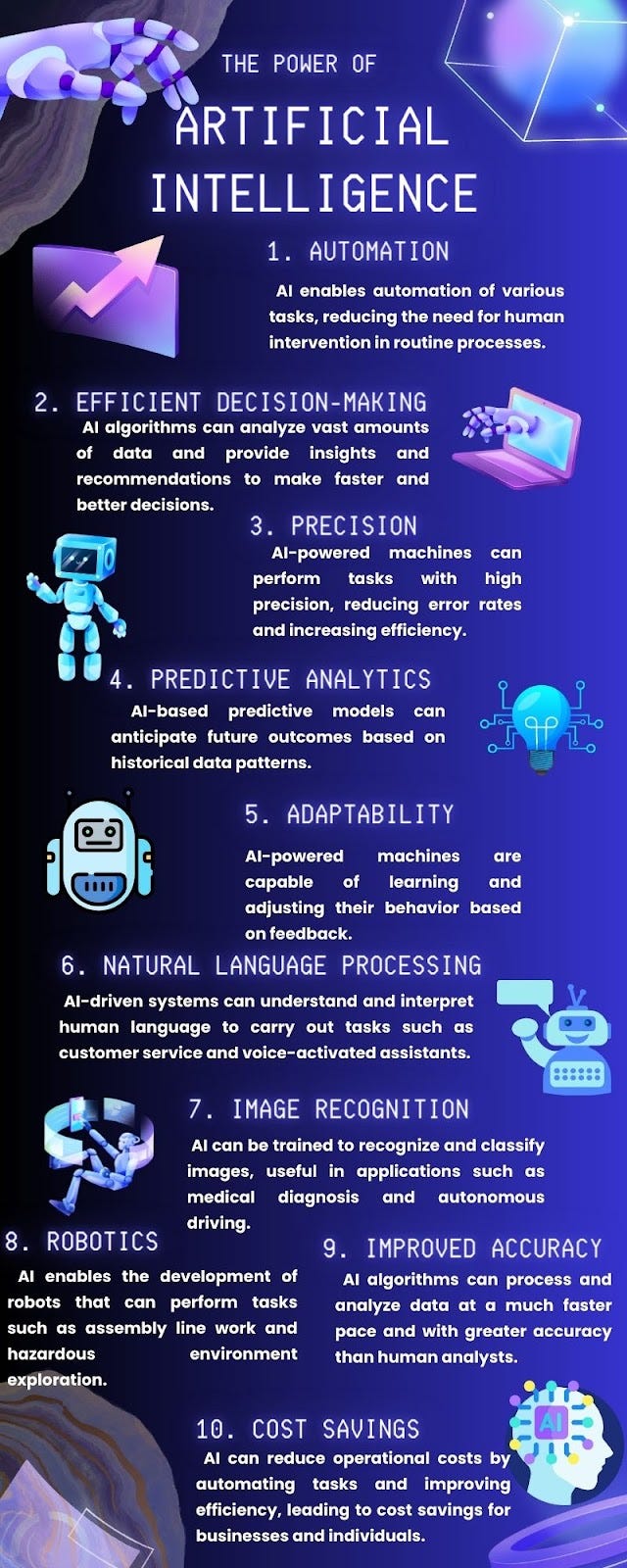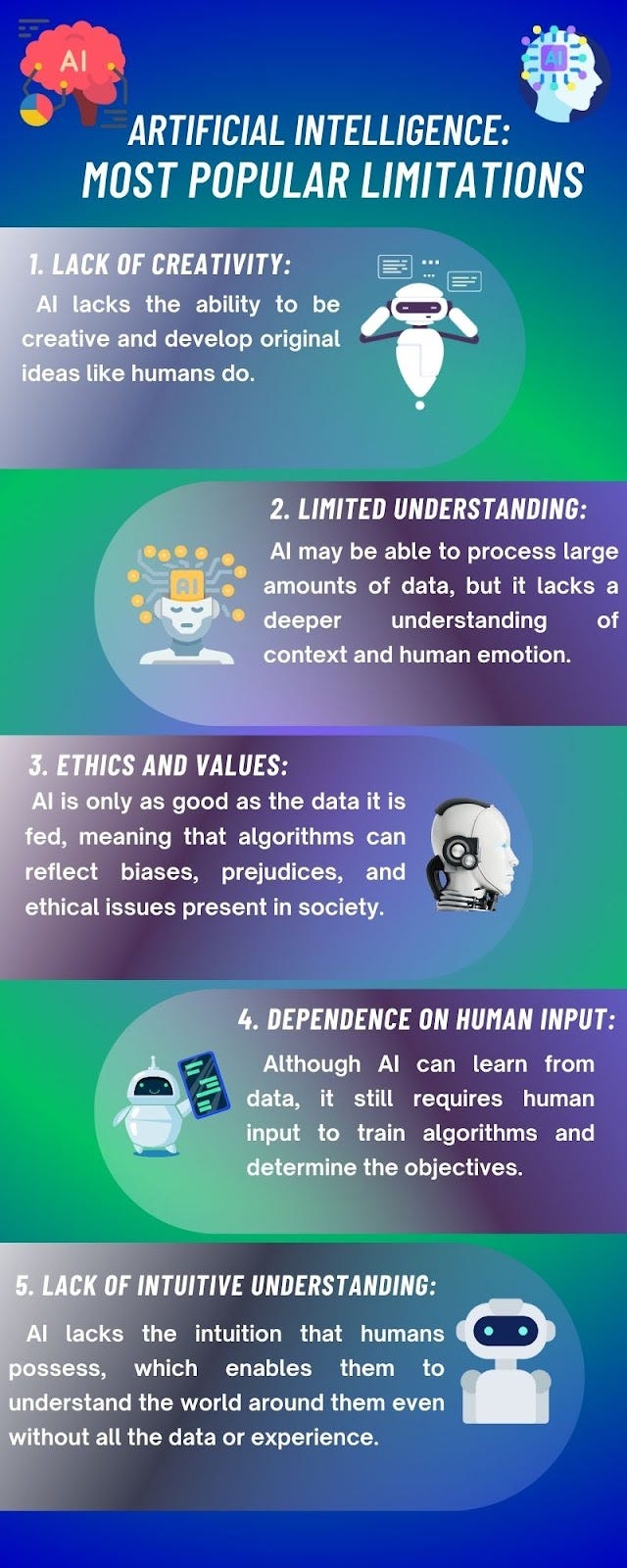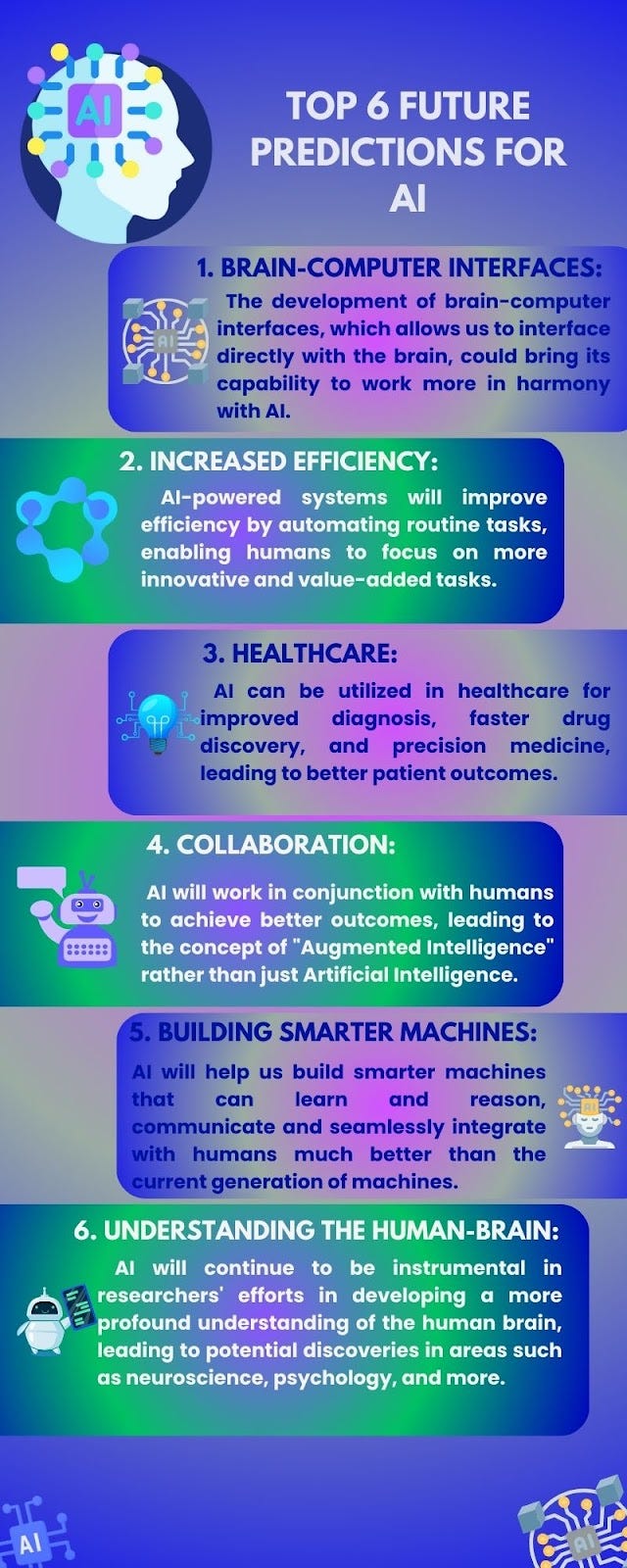Unleashing the Full Potential: The Power of Human Brain and AI Working Together

Artificial intelligence (AI) has made significant strides in recent years, with machines now capable of performing tasks previously thought to be impossible without human intelligence. However, despite these advancements, the human brain remains unparalleled in its complexity and adaptability. The human brain is capable of processing vast amounts of information, performing complex tasks, and adapting to new environments; skills that machines currently struggle with. While AI has its benefits, it is unlikely to replace the human brain anytime soon. Instead, the two will likely work in tandem, with machines assisting and enhancing human capabilities. As such, it is imperative that we continue to study and learn more about the human brain to unlock its full potential.
1- Introduction
Artificial intelligence (AI) has undoubtedly revolutionized the way we think about technology and its potential to automate tasks that were once thought impossible. Despite these advancements, the human brain remains unparalleled in its complexity and adaptability. The human brain processes information and performs tasks with ease, and adapts to new environments with remarkable proficiency. However, as AI continues to evolve, there is the question of whether machines will surpass human capabilities and replace us. In this article, we will discuss the limitations of AI and how it can complement and enhance human capabilities.
2- The Complexity of Human Brain
The human brain is complex beyond measure, with an estimated 100 billion neurons that make up its network. It is capable of processing vast amounts of information, solving complex problems, and adapting to new environments. The brain has the remarkable ability to change itself through a process known as neuro-plasticity, which allows it to continuously learn, grow, and adapt throughout a person’s life.
The human brain is considered one of the most complex and powerful structures in the world. Here are some significant points regarding the complexity of the human brain:
1. Neurons:
The human brain consists of nearly 100 billion neurons that allow for the transmission of information.
2. Cerebral cortex:
The cerebral cortex is the part of the brain responsible for conscious thought and controlling movement.
3. Hippocampus:
The hippocampus is responsible for forming new memories and learning.
4. Cerebellum:
The cerebellum controls balance, coordination, and movement.
5. Synapses:
The synapses in the brain allow for the transfer of information from one neuron to another.
6. Neuro-plasticity:
The human brain is capable of changing itself throughout a person’s life, allowing for constant growth and adaptability.
7. Complexity of thought:
The human brain is capable of generating complex thoughts, emotions, and ideas, including abstract concepts such as language, music, and art.
8. Interconnected systems:
The various parts of the brain work together to process information and control bodily functions.
9. Consciousness:
The human brain is responsible for generating consciousness, allowing for self-awareness and a sense of identity.
10. Limitless potential:
The complexity and adaptability of the human brain make it capable of achieving incredible feats and solving complex problems.
3- The Power of AI
In contrast, AI uses algorithms and mathematical models to perform specific functions. AI systems can analyze vast amounts of data, recognize patterns, and predict outcomes with remarkable accuracy. This has led to the development of applications that can tackle complex tasks such as language translation, image recognition, and voice recognition. AI technology is used in fields such as healthcare, finance, transportation, and other industries to automate processes, increase efficiency, and improve overall performance.
Artificial Intelligence (AI) has become an integral part of the modern technological landscape and has ushered in a new era of innovation. Here are some significant points regarding the power of AI:
1. Automation:
AI enables automation of various tasks, reducing the need for human intervention in routine processes.
2. Efficient decision-making:
AI algorithms can analyze vast amounts of data and provide insights and recommendations to make faster and better decisions.
3. Precision:
AI-powered machines can perform tasks with high precision, reducing error rates and increasing efficiency.
4. Predictive analytics:
AI-based predictive models can anticipate future outcomes based on historical data patterns.
5. Adaptability:
AI-powered machines are capable of learning and adjusting their behavior based on feedback.
6. Natural language processing:
AI-driven systems can understand and interpret human language to carry out tasks such as customer service and voice-activated assistants.
7. Image recognition:
AI can be trained to recognize and classify images, useful in applications such as medical diagnosis and autonomous driving.
8. Robotics:
AI enables the development of robots that can perform tasks such as assembly line work and hazardous environment exploration.
9. Improved accuracy:
AI algorithms can process and analyze data at a much faster pace and with greater accuracy than human analysts.
10. Cost savings:
AI can reduce operational costs by automating tasks and improving efficiency, leading to cost savings for businesses and individuals.

4- The Limitations of AI
While AI has numerous benefits, there are still several limitations that need to be addressed. For instance, AI is excellent at performing specific tasks but lacks the flexibility and creativity of the human brain. It struggles with unpredictable situations and fails to handle complex social interactions. Moreover, AI systems require vast amounts of data to learn and improve, which can be challenging to acquire in certain contexts. Due to these limitations, AI will never replace human intelligence.
Artificial Intelligence (AI) has made significant strides in recent years, but it still has limitations. Here are some significant points regarding the limitations of AI:
1. Lack of creativity:
AI lacks the ability to be creative and develop original ideas like humans do.
2. Limited understanding:
AI may be able to process large amounts of data, but it lacks a deeper understanding of context and human emotion.
3. Dependence on data:
AI algorithms need data to learn and improve, meaning they can struggle when there is a lack of data or biased data.
4. Ethics and values:
AI is only as good as the data it is fed, meaning that algorithms can reflect biases, prejudices, and ethical issues present in society.
5. Complexity of tasks:
Although AI algorithms can perform certain tasks, it can be challenging for AI to perform multi-faceted or complex tasks.
6. Security risks:
AI-powered systems can be vulnerable to hacking, data breaches, and cyber threats, which can have severe consequences.
7. Lack of intuitive understanding:
AI lacks the intuition that humans possess, which enables them to understand the world around them even without all the data or experience.

8. Dependence on human input:
Although AI can learn from data, it still requires human input to train algorithms and determine the objectives.
9. Misinterpretation of language:
AI lacks the ability to understand complex nuances in human language, such as irony and sarcasm, which can lead to interpretations that are incorrect.
10. Unforeseen consequences:
AI can be unpredictable, and unintended consequences could arise from its use, which can lead to adverse effects on humans or society.
5- The Future of AI and Human Brain
As AI continues to evolve, it is becoming clear that it will work alongside the human brain, rather than replace it. While machines can tackle specific tasks with precision, they lack the adaptability, creativity, and emotional intelligence that humans bring to the table. By working together, humans and machines can combine strengths to solve complex problems and make progress. An example of this is in the field of medicine, where AI is used to analyze medical data and assist doctors in diagnosis and treatment planning. Another example is in the field of education, where AI is used to personalize learning and adapt to individual student needs.
Artificial Intelligence (AI) has made impressive progress in recent years, and its potential for the future is enormous. Here are some significant points regarding the future of AI and human brain:
1. Advancements in technology:
AI will continue to evolve and expand its capabilities as technology progresses, allowing us to develop new use cases for AI in different industries.
2. Brain-computer interfaces:
The development of brain-computer interfaces, which allows us to interface directly with the brain, could bring its capability to work more in harmony with AI.
3. Personalization:
AI will enable personalization thanks to its ability to process vast amounts of data and provide personalized recommendations.

4. Increased Efficiency:
AI-powered systems will improve efficiency by automating routine tasks, enabling humans to focus on more innovative and value-added tasks.
5. Healthcare:
AI can be utilized in healthcare for improved diagnosis, faster drug discovery, and precision medicine, leading to better patient outcomes.
6. Ethical considerations:
There will be continue to be ongoing conversations and debates regarding ethical considerations when it comes to AI and its impact on privacy, human rights, and society as a whole.
7. Collaboration:
AI will work in conjunction with humans to achieve better outcomes, leading to the concept of “Augmented Intelligence” rather than just Artificial Intelligence.
8. Building smarter machines:
AI will help us build smarter machines that can learn and reason, communicate and seamlessly integrate with humans much better than the current generation of machines.
9. Innovation:
AI will drive major innovations and improve existing products and services, enhancing our quality of life.
10. Understanding the human brain:
AI will continue to be instrumental in researchers’ efforts in developing a more profound understanding of the human brain, leading to potential discoveries in areas such as neuroscience, psychology, and more.
6- Conclusion
In conclusion, AI has revolutionized technology and helped automate tasks that were once thought impossible. However, it has limitations in its flexibility, creativity, and emotional intelligence. Therefore, it is clear that AI and the human brain need to work together to achieve goals efficiently. By combining the strengths of both, we can unlock the full potential of human intelligence and AI, making progress and advancements that would otherwise be impossible. This partnership between the human brain and AI is the future of technology, and it is evident there are countless benefits to be gained from it.
Comments
Post a Comment